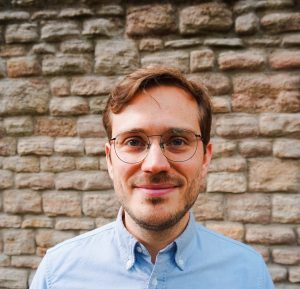
Dr. Philipp Golka loves a good coffee and is a postdoctoral researcher at Leiden University as part of the DEEPEN-team in The Netherlands. In this interview, Philipp tells us about his previous work, the difference between working in Germany and in The Netherlands and how the dynamics of financial governance across Europe are in the heart of the DEEPEN project.
You started your Postdoc at DEEPEN after working as a public sector consultant. What made you change jobs?
That is a great question. I think most of all was a feeling that I missed academic work. Although there were a number of instances where I could apply some sociological concepts in consulting, I really missed doing sociology a lot and that feeling just didn’t subside. Having the opportunity to think about specific issues for years on end and, by doing so, incrementally gaining an understanding of the social forces in our world and developing your own view on them is not just a deeply rewarding endeavor but also a unique privilege. And I just wasn’t ready to give up on that even though there was absolutely nothing wrong with my very insightful consulting job.
What is the biggest difference from working as a consultant to as a researcher?
Starting the consulting job, I thought, it’s similar to research as both require making sense of empirical phenomena. Although this is the case to some extent, there is a bigger than I thought difference between the skill-based approach in consulting and the knowledge-based approach in academia. In consulting you often use fairly simple tools to reduce complexity in order to develop an actionable suggestion. In academia, by contrast, extant knowledge such as theories plays a lot bigger role and rather than reducing complexity you ought to use it for developing your argument. The second key difference is organization: while processes run a lot more smoothly in consulting, this also means less freedom to choose what you want to work on.
What was your reason to join the DEEPEN-project?
My main research interest has always been the interaction between states and financial markets, especially in a context of sustainability. In my PhD, I studied impact investing which is qualitatively interesting for a number of reasons but quantitatively tiny compared to other fields of finance. Pension funds, by contrast, are among the biggest and most powerful financial actors and interact with the state in complex and multifaceted ways. But despite their importance we know so little about them – and being able to change that is an amazing opportunity for which I am very grateful. On top, I’ve always wanted to do comparative research and so I’m very excited about our pan-European approach.
You want to apply economic and organizational sociology, how is that interesting for the DEEPEN-project?
The dynamics of financial governance across Europe are at the heart of the DEEPEN project. A large part of these dynamics occurs at the meso-level of pension funds and their direct environment. For example, how do pension funds view their members and gain an understanding of what they want? How do they ensure the transmission of these member preferences along financial chains, ranging from pension funds to asset managers, mutual funds, and nonfinancial firms? To address questions such as these, economic and organizational sociology has a lot to offer. For example, a sociological perspective can help conceptualizing these dynamics and develop explanations for them.
Is there a difference from working in Germany to working in The Netherlands?
Coming from Germany, the first thing you notice is the speed and ease of administrative processes in Dutch universities – this is really a different world. The second key difference is a significantly higher investment in organizational culture in the Netherlands. This starts with the university buildings that seem to be more designed for interaction and a relaxed atmosphere. But there is also a lot more initiatives, large and small, to make you feel welcome and included in the team, and meetings are often a bit more personal here, which I quite like.
If you have to choose: never going to choir sing again or never going to drink coffee again?
Haha, you are asking me if I rather want to stop feeling alive or awake for the rest of my life. Clearly neither.